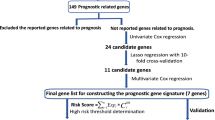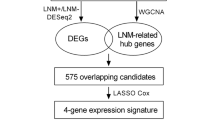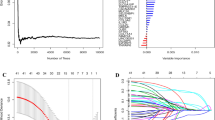Abstract
Purpose
The updated guidelines highlight gene expression-based multigene panel as a critical tool to assess overall survival (OS) and improve treatment for lung adenocarcinoma (LUAD) patients. Nevertheless, genome-wide expression signatures are still limited in real clinical utility because of insufficient data utilization, a lack of critical validation, and inapposite machine learning algorithms.
Methods
2330 primary LUAD samples were enrolled from 11 independent cohorts. Seventy-six algorithm combinations based on ten machine learning algorithms were applied. A total of 108 published gene expression signatures were collected. Multiple pharmacogenomics databases and resources were utilized to identify precision therapeutic drugs.
Results
We comprehensively developed a robust machine learning-derived genome-wide expression signature (RGS) according to stably OS-associated RNAs (OSRs). RGS was an independent risk element and remained robust and reproducible power by comparing it with general clinical parameters, molecular characteristics, and 108 published signatures. RGS-based stratification possessed different biological behaviors, molecular mechanisms, and immune microenvironment patterns. Integrating multiple databases and previous studies, we identified that alisertib was sensitive to the high-risk group, and RITA was sensitive to the low-risk group.
Conclusion
Our study offers an appealing platform to screen dismal prognosis LUAD patients to improve clinical outcomes by optimizing precision therapy.









Similar content being viewed by others
Data availability
The original data presented in the study are freely available from the following websites: UCSC Xena database, https://xenabrowser.net/datapages/. GEO, https://www.ncbi.nlm.nih.gov/geo/. CBioPortal, https://www.cbioportal.org/. CancerSEA, http://biocc.hrbmu.edu.cn/CancerSEA/. PRISM, https://depmap.org/portal/download/. CCLE, https://sites.broadinstitute.org/ccle/. CMap database, https://clue.io/.
Abbreviations
- LUAD:
-
Lung adenocarcinoma
- TNM:
-
Tumor-node-metastasis
- OS:
-
Overall survival
- ctDNA:
-
Circulating tumor DNA
- NGS:
-
Next-generation sequencing
- RGS:
-
Robust machine learning-derived genome-wide expression signature
- FPKM:
-
Fragments per kilobase of million
- TPM:
-
Trans per million
- GEO:
-
Gene Expression Omnibus
- OSRs:
-
OS-associated RNAs
- Enet:
-
Elastic network
- RSF:
-
Random survival forest
- GBM:
-
Generalized boosted regression modeling
- plsRcox:
-
Partial least-squares regression for Cox
- survival-SVM:
-
Survival support vector machine
- SuperPC:
-
Supervised principal components
- C-index:
-
Concordance index
- K–M:
-
Kaplan–Meier
- AUC:
-
Area under the ROC curve
- EMT:
-
Epithelial–mesenchymal transition
- TMB:
-
Tumor mutation burden
- KEGG:
-
Kyoto Encyclopedia of Genes and Genomes
- GO:
-
Gene Ontology
- MSI:
-
Microsatellite instability
- FGA:
-
Fraction of genome altered
- FGG:
-
Fraction of genome gained
- FGL:
-
Fraction of the genome lost
- ICBs:
-
Immune checkpoint blockers
- PRISM:
-
Profiling relative inhibition simultaneously in mixtures
- CTRP:
-
Cancer Therapeutics Response Portal
- ssGSEA:
-
Single-sample gene set enrichment analysis
References
Abiko K, Matsumura N, Hamanishi J, Horikawa N, Murakami R, Yamaguchi K, Yoshioka Y, Baba T, Konishi I, Mandai M (2015) IFN-γ from lymphocytes induces PD-L1 expression and promotes progression of ovarian cancer. Br J Cancer 112:1501–1509. https://doi.org/10.1038/bjc.2015.101
Arashi M, Roozbeh M, Hamzah NA, Gasparini M (2021) Ridge regression and its applications in genetic studies. PLoS One 16:e0245376. https://doi.org/10.1371/journal.pone.0245376
Bastien P, Bertrand F, Meyer N, Maumy-Bertrand M (2015) Deviance residuals-based sparse PLS and sparse kernel PLS regression for censored data. Bioinformatics (oxford, England) 31:397–404. https://doi.org/10.1093/bioinformatics/btu660
Boutsikou E, Domvri K, Hardavella G, Tsiouda D, Zarogoulidis K, Kontakiotis T (2018) Tumour necrosis factor, interferon-gamma and interleukins as predictive markers of antiprogrammed cell-death protein-1 treatment in advanced non-small cell lung cancer: a pragmatic approach in clinical practice. Ther Adv Med Oncol 10:1758835918768238. https://doi.org/10.1177/1758835918768238
Cancer Cell Line Encyclopedia Consortium; Genomics of Drug Sensitivity in Cancer Consortium (2015) Pharmacogenomic agreement between two cancer cell line data sets. Nature 528:84–87. https://doi.org/10.1038/nature15736
Castellanos E, Feld E, Horn L (2017) Driven by mutations: the predictive value of mutation subtype in EGFR-mutated non-small cell lung cancer. J Thorac Oncol 12:612–623. https://doi.org/10.1016/j.jtho.2016.12.014
Cedoz P-L, Prunello M, Brennan K, Gevaert O (2018) MethylMix 2.0: an R package for identifying DNA methylation genes. Bioinformatics 34:3044–3046. https://doi.org/10.1093/bioinformatics/bty156%JBioinformatics
Chougule A, Prabhash K, Noronha V, Joshi A, Thavamani A, Chandrani P, Upadhyay P, Utture S, Desai S, Jambhekar N et al (2013) Frequency of EGFR mutations in 907 lung adenocarcioma patients of Indian ethnicity. PLoS One 8:e76164. https://doi.org/10.1371/journal.pone.0076164
Davoli T, Uno H, Wooten EC, Elledge SJ (2017) Tumor aneuploidy correlates with markers of immune evasion and with reduced response to immunotherapy. Science (new York, NY). https://doi.org/10.1126/science.aaf8399
Dembek KA, Hurcombe SD, Frazer ML, Morresey PR, Toribio RE (2014) Development of a likelihood of survival scoring system for hospitalized equine neonates using generalized boosted regression modeling. PLoS One 9:e109212. https://doi.org/10.1371/journal.pone.0109212
Doggrell SA (2005) RITA—a small-molecule anticancer drug that targets p53. Expert Opin Investig Drugs 14:739–742. https://doi.org/10.1517/13543784.14.6.739
Ettinger DS, Wood DE, Aisner DL, Akerley W, Bauman JR, Bharat A, Bruno DS, Chang JY, Chirieac LR, D’Amico TA et al (2021) NCCN guidelines insights: non-small cell lung cancer, version 2.2021. J Natl Compr Cancer Netw JNCCN 19:254–266. https://doi.org/10.6004/jnccn.2021.0013
Hanahan D, Weinberg RA (2011) Hallmarks of cancer: the next generation. Cell 144:646–674. https://doi.org/10.1016/j.cell.2011.02.013
Hijazo-Pechero S, Alay A, Marín R, Vilariño N, Muñoz-Pinedo C, Villanueva A, Santamaría D, Nadal E, Solé X (2021) Gene expression profiling as a potential tool for precision oncology in non-small cell lung cancer. Cancers. https://doi.org/10.3390/cancers13194734
Kashyap D, Garg VK, Goel N (2021) Intrinsic and extrinsic pathways of apoptosis: role in cancer development and prognosis. Adv Protein Chem Struct Biol 125:73–120. https://doi.org/10.1016/bs.apcsb.2021.01.003
Kim D, Lee YS, Kim DH, Bae SC (2020) Lung cancer staging and associated genetic and epigenetic events. Mol Cells 43:1–9. https://doi.org/10.14348/molcells.2020.2246
Lamb J, Crawford ED, Peck D, Modell JW, Blat IC, Wrobel MJ, Lerner J, Brunet JP, Subramanian A, Ross KN et al (2006) The Connectivity Map: using gene-expression signatures to connect small molecules, genes, and disease. Science (new York, NY) 313:1929–1935. https://doi.org/10.1126/science.1132939
Lin Q, Zhang M, Kong Y, Huang Z, Zou Z, Xiong Z, Xie X, Cao Z, Situ W, Dong J et al (2023) Risk score = LncRNAs associated with doxorubicin metabolism can be used as molecular markers for immune microenvironment and immunotherapy in non-small cell lung cancer. Heliyon 9:e13811. https://doi.org/10.1016/j.heliyon.2023.e13811
Liu N, Wang YA, Sun Y, Ecsedy J, Sun J, Li X, Wang P (2019) Inhibition of Aurora A enhances radiosensitivity in selected lung cancer cell lines. Respir Res 20:230. https://doi.org/10.1186/s12931-019-1194-8
Liu Z, Lu T, Li J, Wang L, Xu K, Dang Q, Liu L, Guo C, Jiao D, Sun Z et al (2021a) Clinical significance and inflammatory landscape of a novel recurrence-associated immune signature in stage II/III colorectal cancer. Front Immunol 12:702594. https://doi.org/10.3389/fimmu.2021.702594
Liu L, Liu Z, Meng L, Li L, Gao J, Yu S, Hu B, Yang H, Guo W, Zhang S (2021b) An integrated fibrosis signature for predicting survival and immunotherapy efficacy of patients with hepatocellular carcinoma. Front Mol Biosci 8:766609. https://doi.org/10.3389/fmolb.2021.766609
Liu Z, Zhang Y, Shi C, Zhou X, Xu K, Jiao D, Sun Z, Han X (2021c) A novel immune classification reveals distinct immune escape mechanism and genomic alterations: implications for immunotherapy in hepatocellular carcinoma. J Transl Med 19:5. https://doi.org/10.1186/s12967-020-02697-y
Liu Z, Weng S, Dang Q, Xu H, Ren Y, Guo C, Xing Z, Sun Z, Han X (2022) Gene interaction perturbation network deciphers a high-resolution taxonomy in colorectal cancer. Elife. https://doi.org/10.7554/eLife.81114
Lynch TJ, Bell DW, Sordella R, Gurubhagavatula S, Okimoto RA, Brannigan BW, Harris PL, Haserlat SM, Supko JG, Haluska FG et al (2004) Activating mutations in the epidermal growth factor receptor underlying responsiveness of non-small-cell lung cancer to gefitinib. N Engl J Med 350:2129–2139. https://doi.org/10.1056/NEJMoa040938
Maeser D, Gruener RF, Huang RS (2021) oncoPredict: an R package for predicting in vivo or cancer patient drug response and biomarkers from cell line screening data. Brief Bioinform. https://doi.org/10.1093/bib/bbab260
Martens RM, Koopman T, Lavini C, Ali M, Peeters CFW, Noij DP, Zwezerijnen G, Marcus JT, Vergeer MR, Leemans CR et al (2021) Multiparametric functional MRI and (18)F-FDG-PET for survival prediction in patients with head and neck squamous cell carcinoma treated with (chemo)radiation. Eur Radiol 31:616–628. https://doi.org/10.1007/s00330-020-07163-3
Niu H, Manfredi M, Ecsedy JA (2015) Scientific rationale supporting the clinical development strategy for the investigational aurora a kinase inhibitor alisertib in cancer. Front Oncol 5:189. https://doi.org/10.3389/fonc.2015.00189
Noronha V, Prabhash K, Thavamani A, Chougule A, Purandare N, Joshi A, Sharma R, Desai S, Jambekar N, Dutt A et al (2013) EGFR mutations in Indian lung cancer patients: clinical correlation and outcome to EGFR targeted therapy. PLoS One 8:e61561. https://doi.org/10.1371/journal.pone.0061561
Ren D, Hua Y, Yu B, Ye X, He Z, Li C, Wang J, Mo Y, Wei X, Chen Y et al (2020) Predictive biomarkers and mechanisms underlying resistance to PD1/PD-L1 blockade cancer immunotherapy. Mol Cancer 19:19. https://doi.org/10.1186/s12943-020-1144-6
Shan N, Li N, Dai Q, Hou L, Yan X, Amei A, Lu L, Wang Z (2020) Interplay of tRNA-derived fragments and T cell activation in breast cancer patient survival. Cancers. https://doi.org/10.3390/cancers12082230
Shigemizu D, Akiyama S, Asanomi Y, Boroevich KA, Sharma A, Tsunoda T, Matsukuma K, Ichikawa M, Sudo H, Takizawa S et al (2019) Risk prediction models for dementia constructed by supervised principal component analysis using miRNA expression data. Commun Biol 2:77. https://doi.org/10.1038/s42003-019-0324-7
Siegel RL, Miller KD, Fuchs HE, Jemal A (2021) Cancer statistics, 2021. CA Cancer J Clin 71:7–33. https://doi.org/10.3322/caac.21654
Simon N, Friedman J, Hastie T, Tibshirani R (2011) Regularization paths for Cox’s proportional hazards model via coordinate descent. J Stat Softw 39:1–13. https://doi.org/10.18637/jss.v039.i05
Sun J, Zhao T, Zhao D, Qi X, Bao X, Shi R, Su C (2020) Development and validation of a hypoxia-related gene signature to predict overall survival in early-stage lung adenocarcinoma patients. Ther Adv Med Oncol 12:1758835920937904. https://doi.org/10.1177/1758835920937904
Sung H, Ferlay J, Siegel RL, Laversanne M, Soerjomataram I, Jemal A, Bray F (2021) Global Cancer Statistics 2020: GLOBOCAN estimates of incidence and mortality worldwide for 36 cancers in 185 countries. CA Cancer J Clin 71:209–249. https://doi.org/10.3322/caac.21660
Šutić M, Vukić A, Baranašić J, Försti A, Džubur F, Samaržija M, Jakopović M, Brčić L, Knežević J (2021) Diagnostic, predictive, and prognostic biomarkers in non-small cell lung cancer (NSCLC) management. J Pers Med. https://doi.org/10.3390/jpm11111102
Tang H, Wang S, Xiao G, Schiller J, Papadimitrakopoulou V, Minna J, Wistuba II, Xie Y (2017) Comprehensive evaluation of published gene expression prognostic signatures for biomarker-based lung cancer clinical studies. Ann Oncol 28:733–740. https://doi.org/10.1093/annonc/mdw683
Taylor JM (2011) Random survival forests. J Thorac Oncol 6:1974–1975. https://doi.org/10.1097/JTO.0b013e318233d835
Thorsson V, Gibbs DL, Brown SD, Wolf D, Bortone DS, Ou Yang TH, Porta-Pardo E, Gao GF, Plaisier CL, Eddy JA et al (2018) The immune landscape of cancer. Immunity 48:812-830.e814. https://doi.org/10.1016/j.immuni.2018.03.023
Van Belle V, Pelckmans K, Van Huffel S, Suykens JA (2011) Improved performance on high-dimensional survival data by application of Survival-SVM. Bioinformatics (oxford, England) 27:87–94. https://doi.org/10.1093/bioinformatics/btq617
Wang L, Liu Z, Zhu R, Liang R, Wang W, Li J, Zhang Y, Guo C, Han X, Sun Y (2022) Multi-omics landscape and clinical significance of a SMAD4-driven immune signature: Implications for risk stratification and frontline therapies in pancreatic cancer. Comput Struct Biotechnol J 20:1154–1167. https://doi.org/10.1016/j.csbj.2022.02.031
Yang C, Huang X, Li Y, Chen J, Lv Y, Dai S (2021) Prognosis and personalized treatment prediction in TP53-mutant hepatocellular carcinoma: an in silico strategy towards precision oncology. Brief Bioinform. https://doi.org/10.1093/bib/bbaa164
Yuan H, Yan M, Zhang G, Liu W, Deng C, Liao G, Xu L, Luo T, Yan H, Long Z et al (2019) CancerSEA: a cancer single-cell state atlas. Nucleic Acids Res 47:D900-d908. https://doi.org/10.1093/nar/gky939
Zhang C, Zhang G, Sun N, Zhang Z, Zhang Z, Luo Y, Che Y, Xue Q, He J (2020) Comprehensive molecular analyses of a TNF family-based signature with regard to prognosis, immune features, and biomarkers for immunotherapy in lung adenocarcinoma. EBioMedicine 59:102959. https://doi.org/10.1016/j.ebiom.2020.102959
Zhang Y, Yao Y, Xu Y, Li L, Gong Y, Zhang K, Zhang M, Guan Y, Chang L, Xia X et al (2021a) Pan-cancer circulating tumor DNA detection in over 10,000 Chinese patients. Nat Commun 12:11. https://doi.org/10.1038/s41467-020-20162-8
Zhang Z, Zhang S, Li X, Zhao Z, Chen C, Zhang J, Li M, Wei Z, Jiang W, Pan B et al (2021b) Reference genome and annotation updates lead to contradictory prognostic predictions in gene expression signatures: a case study of resected stage I lung adenocarcinoma. Brief Bioinform. https://doi.org/10.1093/bib/bbaa081
Funding
This work was supported by the Henan Province Medical Research Project, Henan, China (No. LHGJ20190388).
Author information
Authors and Affiliations
Contributions
XG contributed to the study design and data analysis. XG contributed to manuscript writing. XH contributed to project oversight and manuscript revisiting. HX and SW collected samples and generated data. WY offers the funding. WY, YZ, LL, LW, ZX, YB, SL, and LFL contributed to manuscript revisiting. All authors read and approved the final manuscript.
Corresponding authors
Ethics declarations
Conflict of interest
The authors have no relevant financial or non-financial interests to disclose.
Additional information
Publisher's Note
Springer Nature remains neutral with regard to jurisdictional claims in published maps and institutional affiliations.
Supplementary Information
Below is the link to the electronic supplementary material.
Rights and permissions
Springer Nature or its licensor (e.g. a society or other partner) holds exclusive rights to this article under a publishing agreement with the author(s) or other rightsholder(s); author self-archiving of the accepted manuscript version of this article is solely governed by the terms of such publishing agreement and applicable law.
About this article
Cite this article
Ge, X., Xu, H., Weng, S. et al. Systematic analysis of transcriptome signature for improving outcomes in lung adenocarcinoma. J Cancer Res Clin Oncol 149, 8951–8968 (2023). https://doi.org/10.1007/s00432-023-04814-y
Received:
Accepted:
Published:
Issue Date:
DOI: https://doi.org/10.1007/s00432-023-04814-y




